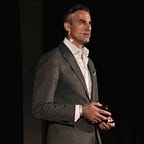How FedEx and Batman are unlikely sources of professional wisdom
Frederick Smith, the CEO of FedEx, was once asked what he thought his company did. At first glance, it seems like a stupid question; FedEx is the world’s premier shipping and courier service. But according to company lore, the business really took off when the CEO realized that they weren’t actually in the express package business.
As he noted later, “We thought that we were selling the transportation of goods; in fact, we were selling peace of mind.” This may seem like a glib reformulation, but the reframing of his organization’s purpose had far-reaching consequences.
Think about it for a second: how does FedEx’s value proposition change if it evolved from (simply) delivering parcels to providing peace of mind? First, excellent logistics becomes a necessary — but not sufficient — condition for success. That’s still vitally important: Federal Express doesn’t become a verb without building a remarkable track record of reliability. But reassuring clients required more; the company started investing in tracking technology to allow people to follow their package from pick-up to delivery. That transparency and real-time reporting wasn’t necessary to the parcel delivery business, but it was critical to the peace of mind business.
I linger on this example because I’ve come to use this as a clarifying question for organizations. Asking what I call the FedEx question is to answer: what business are we really in?
This reflection gets to the heart of your company’s mission which, when clarified and communicated well, will allow you to run your company well today. But it’s also helpful in pointing the way towards a new tomorrow.
CNIB
The CNIB used to be known as the Canadian National Institute for the Blind. As such, its’ mission was to support visually impaired people. A few years ago, they realized that goal was as limiting as it was laudable: thanks to medical advances, their “customers” — Canadians who have experienced vision loss — were an increasingly small subset of society. This did not diminish the importance of the organization’s work, but it did circumscribe the circle of Canadians they served. Rather than remain attached to their traditional mission, they had the foresight (no pun intended) to pivot to a broader objective. They rebranded themselves as CNIB (dropping the heavy emphasis on “blind”) and re-positioned themselves as Canada’s leading visual health organization. In doing so, they went from servicing the half a million Canadians who have experienced vision loss to the 35 million citizens of Canada, all of whom are presumably concerned with maintaining a healthy pair of peepers.
CNIB used the FedEx question to chart a more relevant mission for its future. But what if you’re just a company of one? What question can you pose to bring the same clarity to your calling?
Batman
Let me answer that question with a different one: what is Batman’s superpower? The Dark Knight seemingly doesn’t have any. He can’t fly or deflect bullets; he doesn’t have a magic hammer and he wasn’t bitten by a radioactive spider. I say that his superpower is his mind. It gives Bruce Wayne his weapons and his will, and he has used it to master 127 martial arts and become the world’s greatest detective.
The answer to this question is not an obvious one — which is why, in part, it has so much significance. It doesn’t lend itself to a quick reply; one needs to reflect. If you’re wondering about a career change, ponder this: what do you do better than anybody, in part because you love it and would do it for free? That’s your superpower, and that’s where you start.
I recently met with a friend in the midst of a personal reinvention. He had been successful in the past decade as a print publisher, but the defection of his customers to digital platforms hobbled his old business. He was looking for a second act, and when we met up I asked the Batman question: what was his superpower? It turns out that it was story telling. He built a great magazine that painted an aspirational view of the city we live in. We realized together that the tools used to tell a story change over time — from a print magazine then to Instagram today and perhaps virtual reality tomorrow — but the principles will remain the same. His encore career, I’m convinced, will come from plying his timeless storytelling skills on new platforms; ultimately, the how is much less important than the what and the why.
Asking and answering these two questions can transform the trajectory of your company or career. If you’re an organization seeking clarity of purpose or a new mission, pose the FedEx question: what business are we really in? If you’re an individual seeking a starting point for reinvention, ask yourself the Batman question: what is my superpower?
Jonas Salk knew a thing or two about how to gain insights. He is, after all, best known for having discovered Penicillin and curing Polio. So when he extols the power of a well-posed query, I’m inclined to listen: “What people think of as the moment of discovery is really the discovery of the question.”
If you found this article useful or interesting, consider following me on Medium or subscribing to my free monthly email newsletter at www.IonValis.com
